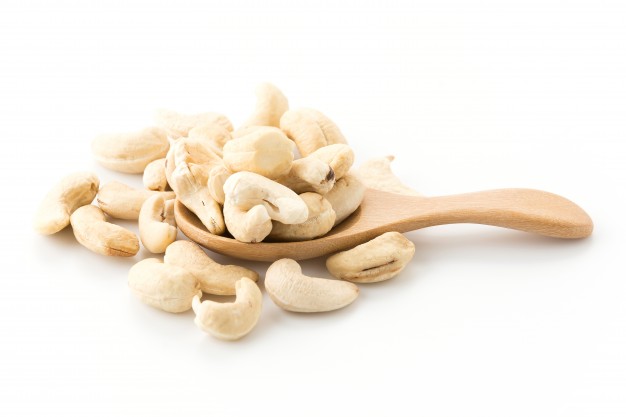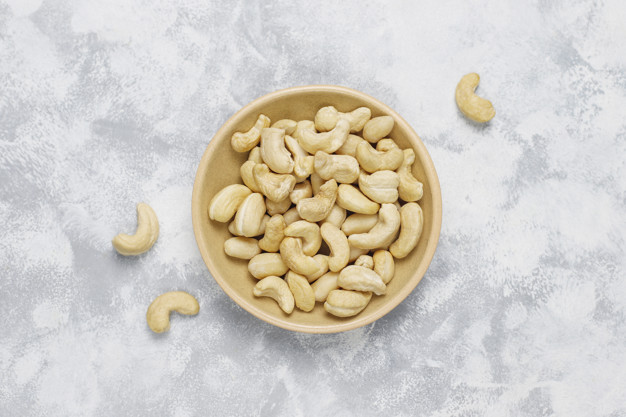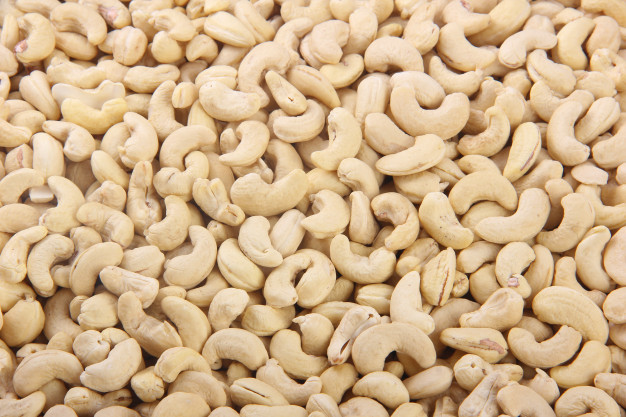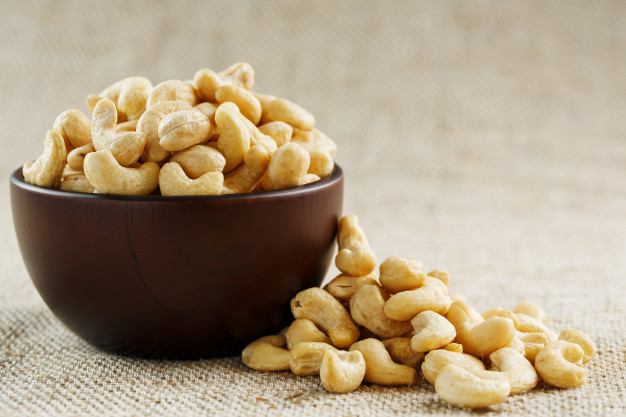Cashew is a delicious nut significantly rich in micronutrients and offers numerous health benefits.
Nutritional profile
- It contains desirable amount of carbohydrate and dietary fibre
- It also contains protein
- It contains fat too. It has a healthy ratio of saturated and unsaturated fatty acids hence it is considered as a food with healthy fat whereas it is completely free from cholesterol
- It contains several micronutrients that play numerous biochemical functions of body. It is significantly rich in Vitamin K, Vitamin B1, Vitamin B6, calcium, phosphorus, copper, magnesium, selenium, zinc and iron

Health benefits
Role on skeletal system
- Calcium, phosphorus, zinc, copper and Vitamin K components of cashew play incredible role in developing healthy bones
- It helps to enhance the strength of bones and reduces the risk of bone fractures
- It helps to improve the bone mineral density hence increases bone mass
- Individual who have osteoporosis should include cashew in their diet as it helps to improve their symptoms by making bones less prone to breakage
Role on eye health
-
 Consumption of cashew is exceptionally effective for improving vision
Consumption of cashew is exceptionally effective for improving vision - It also helps to protect the eye from oxidative damages
- Lutein and zeaxanthin components of cashew are considered as the most imperative constituents that play significant role in improving eye health and reduces the risk of developing eye disorders
- It also helps to protect the eye from the harmful effects of UV ray
- It has seen that consumption of cashew is very beneficial for reducing the prevalence of cataract and macular degeneration
Role on nervous system
- It helps to promote the growth and development of central and peripheral nervous system
- Its fatty acid, copper, zinc and manganese components play significant role in improving the functionality of brain
- It is related with regulating mood hence helps to decrease depression as well as anxiety
- It helps to improve cognitive function as well
- It is also very effective for preventing the prevalence of Attention deficit hyperactivity disorder (ADHD)
Role on hepatic health
- It has lipid lowering activities. The unsaturated fatty acid compounds of cashew play significant role in reducing the concentration of LDL, VLDL and triglyceride in blood
- It helps to promote hepatic function by preventing fatty infiltration of liver cells (deposition of lipid within the cytoplasm of liver cell)
- It also helps to decrease the prevalence of forming gallstones by reducing the concentration of cholesterol

Role on skin
- It plays important role in making the skin look glowing as well as radiant
- It is packed with antioxidant, which is related with improving skin health. It helps to protect the skin from oxidative damages thus decreases the risk of developing dermal disorders
- It helps to prevent ageing as well
- Copper component of cashew also plays imperative role in promoting skin health. It has seen that copper along with some other enzymes help to stimulate the synthesis of collagen, which is associated with improving the elasticity of skin

Role on hair
- Consumption of cashew is very beneficial for promoting hair growth
- Application of cashew nut oil to scalp is also very effective for improving hair health
- It helps to improve hair strength
- It is also related with enhancing hair colour
- Oleic acid and linoleic acid components of cashew are responsible for providing the hair a silky smooth texture
Role on weight management
- Though it is considered as a calorie rich food but it can also helps in weight reduction if taken moderately due to its fatty acid composition. It has seen that it mostly contains monounsaturated fatty acid (MUFA), which plays significant role in weight reduction
- It also contains adequate amount of omega 3 fatty acid that is related with increasing metabolism and fat burning that enhnces the progress of weight reduction
- Copper content of cashew also plays vital role in reducing body weight as it helps in energy production by regulating metabolism
- Consumption of cashew is associated with reducing appetite as it provides a feeling of fullness hence decreases food intake thus reduces the risk of gaining weight

Role on thyroid gland
- Cashew is an important source of selenium, which is an imperative trace element required for enhancing thyroid functions
- It is also associated with maintaining the level of thyroid hormones within body
- It helps to protect thyroid tissues from oxidative damages hence improves their functionality
- Consumption of cashew (in moderation) is very effective for reducing the prevalence of thyroid disorders
Role on preventing cancer
- Cashew contains proanthocyanidins, which are a class of flavanols are considered as the principal anti-carcinogenic substances. These compounds significantly reduces the growth of tumor cells
- It also helps to suppress the growth and division of malignant cells
- It helps to prevent metastasis as well
- It has seen that consumption of cashew is extremely helpful for decreasing the susceptibility of colon cancer
Therapeutic application

- It is considered as an imperative therapeutic substance that significantly improves cardiac health. Its unsaturated fatty acid contents especially MUFA plays imperative role in enhancing the concentration of HDL in body and also related with reducing the level of LDL. Hence its consumption is awfully useful for maintaining a healthy lipid profile
- It helps to decrease plaque formation within blood vessels (especially in artery) hence reduces the risk of developing atherosclerosis and coronary artery disease
- It helps to reduce the prevalence of heart attacks and strokes as well
- It is also very beneficial for reducing hypertension
- It helps to stimulate the formation of RBC as it contains significant amount of iron and copper. Thus it is better to consume cashew for avoiding the risk of developing anemia
- It helps to control blood sugar concentration by preventing insulin resistance. It mainly helps to improve the symptoms of type 2 diabetes mellitus
- It helps to prevent migraine pain as its magnesium content is responsible for decreasing the severity as well as the frequency of migraine attacks
- It is also associated with reducing the prevalence of digestive disorders as it contains adequate amount of fibres
- Its micronutrients and antioxidant components play imperative role in boosting up the overall immunity of body hence decreases the susceptibility of developing chronic diseases
General consideration of using cashew
- It is used for preparing gravies or curries
- It is also used in powered form or raw for preparing sweets and desserts
- It is also used to prepares chocolates
- It can used for preparing butter
- It can also used as a topping ingredients
- It is well utilized for preparing sauces
- It can be consumed raw or can also be consumed roasted
- It can consumed by only adding salt
- It is better to store cashew in proper way for preventing its spoilage
- It should keep away from air as it contains fats, which can easily undergo oxidation and become rancid
- It should also keep away from water as moisture is related with spoiling its texture and taste

Risk factors
Excessive consumption of cashew should be avoided as it can cause various health hazards like indigestion, flatulence, diarrhoea, nausea, constipation, obesity and joint swelling. Thus it is always better to consume cashew in moderate amount.

Source:
Amevor, P.M., Laryea, D. and Barimah, J., 2018. Sensory evaluation, nutrient composition and microbial load of cashew nut–chocolate spread. Cogent Food & Agriculture, 4(1), p.1480180.
Cordeiro, T.A., A REVIEW ON THE NUTRITIONAL ASPECTS AND HEALTH BENEFITS OF CASHEW (ANACARDIUMOCCIDENTALE). Principal's Message, p.85.
Griffin, L.E. and Dean, L.L., 2017. Nutrient composition of raw, dry-roasted, and skin-on cashew nuts. Journal of Food Research, 6(6), pp.13-28.
Jalali, M., Karamizadeh, M., Ferns, G.A., Moosavian, S.P., Zare, M. and Akbarzadeh, M., 2020. The Effects of Cashew Nut Intake on Lipid Profile and Blood Pressure: A Systematic Review and Meta-analysis of Randomized Controlled Trials. Complementary Therapies in Medicine, p.102387.
Malik, J.A. and Bhadauria, M., 2020. Cashew Nut (Anacardium occidentale). In Antioxidants in Vegetables and Nuts-Properties and Health Benefits (pp. 539-557). Springer, Singapore.
Mohan, V., Gayathri, R., Jaacks, L.M., Lakshmipriya, N., Anjana, R.M., Spiegelman, D., Jeevan, R.G., Balasubramaniam, K.K., Shobana, S., Jayanthan, M. and Gopinath, V., 2018. Cashew nut consumption increases HDL cholesterol and reduces systolic blood pressure in Asian Indians with type 2 diabetes: a 12-week randomized controlled trial. The Journal of nutrition, 148(1), pp.63-69.
Tufail, T., Saeed, F., Ain, H.B.U., Niaz, B., Afzaal, M., Din, A. and Suleria, H.A.R., 2019. Cashew nut allergy; immune health challenge. Trends in Food Science & Technology, 86, pp.209-216.


